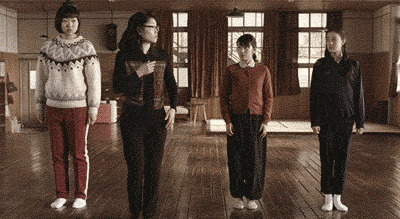A little less than a week after Sean P. Fodera’s derogatory, sexist comments about former SFWA Secretary and VP, Mary Robinette Kowal, hit the internet, Fodera issued an apology to Kowal, and offered his thoughts on women and sexism in the SF/F world. (Apparently there have been problems with sff.net crashing, so Natalie Luhrs managed to get screencaps of both Fodera’s apology and follow up post.)
Kowal has graciously accepted Fodera’s apology and no one gets to say “boo” to her for doing so. She was, after all, singularly named and targeted by Fodera, despite his later assertion that he was more frustrated with policies and changes made by the SFWA board as a whole. Kowal is apparently satisfied by the sincerity in Fodera’s apology, and I don’t see any reason to doubt that. Certainly no one gets to tell Kowal how she should or should not feel and react about Fodera’s apology to her.
However, sincerity or lack thereof isn’t the reason I’m less than impressed with either of Fodera’s statements, nor does his “sincerity” mean that it’s wrong to take a critical look at the substance of Fodera’s apology and subsequent “thoughts” about women in SF/F and sexism. Fodera’s appalling statements about Kowal, his apology and attempt at an explanation are an all-too-common example of how sexism gets excused and brushed off as merely the product of a snapped temper, rather than the result of deeply held and often unexamined biases and some pretty screwed up expectations about how men and women are supposed to act when expressing anger and disagreement.
While Fodera apologizes for what he said about Kowal and apparently regrets any hurt he caused her, he seems to have completely missed the fact that what he said wasn’t just about Kowal and whether or not he liked her. The same tired, predictable and inherently harmful sexist language calling into question Kowal’s professionalism because of what she wore was wrong regardless of whether or not he liked her as a person and/or respected her work as a professional. No woman deserves to be treated that way merely by virtue of her gender and personal respect or affection (or lack thereof) has nothing to do with it. When Fodera attacked Kowal that way, he wasn’t just flinging crap at her, he was flinging crap at every single woman who has ever had that same line of sexist bullshit thrown at her for merely speaking up for herself. That splash damage was just as infuriating as Fodera’s targeted statements at Kowal, and nowhere in Fodera’s apology does he acknowledge this.
Fodera was clearly upset over feeling that his contributions to SFWA were being ignored and that he was being marginalized after a long history of participation. While those feelings are understandable, that doesn’t excuse the way that Fodera chose to handle them. I don’t doubt that Fodera is sorry that he hurt Kowal, but there’s also a palatable sense that he’s just as sorry that he got called out for what he said and if only people understood his pain, they wouldn’t be so mad at him, because there’s a lot of attempts at justification for why he was upset enough to say what he did.
In context, I had invested nine years working diligently and effectively for SFWA under six presidents (Spinrad, Lee, Asaro, Bailey, Capobianco, and Davis), serving on nine committees (chairing two of those), only to see most of those committees dissolved, or reduced in mission and impact in my final year of membership and since. SFWA used to do excellent work in educating writers (members and non-members alike) on the business of writing – contracts, copyrights, estate planning, etc. SFWA has continued to matter to me, as I think it can still be a very powerful organization in the genre. I’d simply like to see them doing more outreach and making resources available to writers who haven’t yet reached SFWA eligibility.
When the question was raised in this forum why SFWA’s focused shifted inward, I pointed solely at Mary, which I should not have done, and my comments about her devolved into hyperbole.
It’s just that he cares so much about SFWA, young writers and SF/F, you see, so of course he lost his temper and lashed out at this one specific person who happens to be a woman and his words just happened to be sexist drivel – it just happened, it’s not like he had any control over what he typed in a public forum, right?
Over at Scalzi’s post about Fodera’s apology, Kat Goodwin makes an excellent point about how Fodera’s behavior and subsequent repentance is a common dynamic reflective of male privilege:
[H]ere’s the thing, men are used to it being okay for them to be “riled up” and when riled up, to attack people. And in particular, to attack women, who they know will not get a lot of sympathy for being verbally attacked (and not even necessarily if physically attacked,) and who are more likely to give them a response as Kowal did with Fedora. They are used to it being okay to go after women because women are vulnerable, disvalued and blocked in the society and because the society will excuse their behavior on the grounds that they are a man who lost his temper.
This is part of what we call male privilege in the society — male anger in a discussion is okay, excessive perhaps but understandable because he is a man — he’s in power and allowed — and such behavior does not signal the downfall of civilization, like women’s anger does. Because it is okay, it’s considered wrong to label it abusive and heavily criticize it, even though it was in the context of the other thing that is okay for both men and women to do, which is talk about women in sexualized terms, in degrading and derogatory terms, in insults, threats, and false claims. It’s verbal abuse, which Kowal herself fully recognized, and it is calculated to present the idea that a woman has overstepped her place, frustrating the man and producing this over-reaction from the man. It’s all the woman’s fault that he lost his temper.
Goodwin also points out how the expected dynamic would have shifted had Kowal been a man and the argument had ensued between two men, rather than a man and a woman:
If Kowal had been a man, Fodera would not have, in criticizing and insulting her, talked about her body, purity, etc., and done gender specific insults. If Kowal had been a man and responded to the insults with an FU, this would not have been seen as an unreasonable reaction from a man, but very unacceptable from a woman, even with the sexualized insults. In fact, if Kowal as a man had engaged in a war of words with Fodera over the insults, creating a feud, it would be well in the tradition of grand feuds between authors in SFFH. Those feuds very seldom involve women authors because it is not considered reasonable and professional for women to engage in that sort of aggression and it can have strong business consequences for them.
Essentially, Fodera’s apology is about him “losing his temper” and being “mean” to Kowal, rather than about his pernicious attempt to dismiss her opinions and devalue her work purely on the basis of her gender. It is heavily problematic because it fits right into an established social norm in which men can lose their tempers and throw out bile about how a woman who likes wearing diaphanous white dresses on the beach doesn’t deserve to be taken seriously, just because he disagrees with her, but heaven forfend that a woman lose her temper and refer to people slinging sexist malarky at her as “rabid weasels.” Despite any remorse he might feel, Fodera doesn’t seem to understand why singling out Kowal as the target for his ire, despite the fact that he was upset about the changes being made to SFWA (many of which apparently dissolved committees and projects in which he’d been involved) and the leadership in general, was in and of itself manifestly sexist. .
That impression is further cemented by Fodera’s follow-up statement about “women in SF/F.” As Avery Tillett Ke pointed out in Scalzi’s entry, Fodera’s second statement managed to snatch defeat from the jaws of victory:
It is certain that in any community, there will be individuals who do not get along as individuals, without that disagreement indicating a blanket condemnation of any group, gender, ethnicity, race or religion. There are male writers, editors and agents with whom I prefer not to associate, as there have been writers, editors and agents of both genders who did not wish to associate with me prior to recent events. Such is the nature of society that we simply don’t create positive relationships with everyone we encounter, much as we might like to do so.
Well, yes, disagreement is a natural part of life, but the problems women face in SF/F, much less our overarching patriarchal culture, isn’t about “disagreement” so much as it is about systemic inequalities based on arbitrary definitions and expectations surrounding gender, and fighting for women to be treated with the same level of respect given to the men in their professional fields. We can accept that disagreements occur between people without accepting that institutionalized sexism is unchangeable and just something we’re going to have to learn to live with.
While my comments about Mary Robinette Kowal were inconsiderate, they were taken out of context, edited to change their meaning, and given a misleading headline and interpretation that certainly prejudiced anyone following the links to the original posts. This has given many people a very inaccurate view of who I am, and where I stand on the matter of gender in science fiction. At no time did I ever indicate that I “don’t want women to write science fiction”, as stated in The Daily Dot…
No, Fodera didn’t say that he didn’t “want women to write science fiction,” but again, that’s not what he was being criticized for saying. He was criticized for his sexist invective directed at Kowal, which, as even Kowal noted herself, is the same kind of treatment countless women have received in return for standing up for themselves or merely voicing disagreement.
I’m not even going to touch the fact that Fodera’s still asserting that he could have brought a lawsuit against the Daily Dot for the above-linked article if he really wanted, but Popehat has a fairly lengthy and detailed explanation for why a successful suit by Fodera would be highly unlikely.
For the past 25 years of my career in publishing, I have been an admirer of women in publishing… I worked for seven years at DAW Books; the only major, female-owned genre publisher. In my time there, I worked with some of the best and brightest female authors of our genre, giving them ground-breaking placement in our ebook publishing program, and promoting them to our licensees… I was part of the SFWA committee that created the Andre Norton Award for Young Adult Science Fiction and Fantasy to honor one of the genre’s great voices, male or female, and which award has been dominated by female writers… In short, I am not now, nor have I ever been, nor will I ever be, antithetical to female writers in our genre or any genre. If people wish to believe otherwise based on recent events, I’ll have to live with the shame and embarrassment of that appearance. Any of the women writers listed above, or any who actually know me in real life, should be able to tell you that I am one of the most ardent supporters of female genre writers you’ll ever meet.
Fodera spends over 750 words describing how much he loves science fiction written by women, how much of his career has been spent working with women in the industry and promoting the work of women in the genre and how much he respects women authors. He even spends an entire paragraph talking about his involvement in kids’ softball and supporting a (sadly failed) attempt at getting boys and girls softball teams to play each other, and another full two paragraphs on how he encourages his daughter to read more fiction by women. There are just so many women who would speak to his good character if people would just ask them. The obvious implication being that because of all these bona fides and qualifications, clearly Fodera isn’t a sexist and the fact that some people now have his perception of him because of his own words and actions is just such a terrible burden of shame that he now has to live with.
Let’s get this out of the way first: No, I don’t think Fodera is a misogynist in the same vein as Vox Day. No, I don’t think he actively hates women and believes that women are inherently incapable of writing SF/F. This doesn’t mean that he doesn’t hold unexamined sexist attitudes and is contributing, however unintentionally, to the pervasive sexist problems in SF/F.
The problem is that Fodera’s entire statement demonstrates that he’s apparently laboring under the same problematic assumption as many “well-meaning” would-be allies: Mainly, that “liking women,” “respecting their work,” and not being “antithetical to women writers” means that they can’t be sexist. Fodera’s statement is, in essence, one long, rambling “But some of my favorite writers and best friends are women!” derailment bingo square.
It can’t be stated enough that intent doesn’t always mitigate impact, and while Fodera didn’t intend to be sexist, that doesn’t change the fact that the impact of his actions undeniably contributed to the sexism that continues to plague SF/F. He got mad about something he cares about and had disagreements with people – it happens to everyone – but he took that extra step into the same reflexive misogyny that taints so much of SF/F and our culture at large. And instead of stepping back and considering how his actions played into this toxic dynamic, he’s doubling down and refusing to acknowledge that his actions were sexist and harmful, because he’s an “admirer of women in publishing” and has supported women in the genre during his career.
This is why it’s necessary to keep applying a critical eye to “explanations” or apologies like Fodera’s, especially when they employ this particular brand of circular logic: “I’m not a sexist so nothing I say/do can be sexist.” It’s extraordinarily frustrating, not to mention exhausting, how often this mindset results in otherwise well-meaning people pulling up defenses and reacting as if their very character’s been impugned when someone points out how something they just said or did was sexist. It neatly allows one to avoid any need for self-reflection or taking responsibility for causing harm, because if you’re not sexist because you say so, clearly that person is just being hypercritically sensitive and plain mean by daring to say that you just did/said something sexist, even though you didn’t mean to. And besides, you actually like and respect the woman you just threw sexist crap at, so it wasn’t really sexist, it was just you being mad and unable to control your poor word choices. Why is that just so hard to understand and not be upset about?
Our culture is sexist, we swim in sexism the moment we leave the womb, and regardless of gender, we’ve all internalized it to varying degrees. This is why it’s so important to continue checking our words and actions, to listen when called out, and to understand that our intent doesn’t always mitigate the impact of what we say or do, rather than retreating into a defensive bubble.

“That thing you just said is kinda sexist.” “I’m not sexist, some of my best friends are women and I love Anne McCaffrey – wait, where are you going??”
I said it earlier, but the point bears repeating here: Sexism isn’t merely a matter of “hating women” or being “mean” to women. Nor is it ok to use sexist, misogynistic language in attacking women you don’t like. One should be sorry about both using sexist, misogynistic rhetoric in expressing disagreement with a woman, regardless of if one likes and/or respects her or not, as well as any hurt feelings of a specific individual.
I’m glad Fodera apologized. I’m glad for Kowal that she’s ok with it, because she deserved that apology, at minimum. As Scalzi noted, apologies can be useful things, especially if done correctly. I’m just disappointed that Fodera’s statements lacked any deeper indication of self-awareness beyond, “I’m sorry I was mean to this one person, but it’s not fair people criticized me for being a sexist jerk even though I was, because I’m a good person who cares about SF/F and I like women writers! And besides, you mean people almost made my book-loving daughter give up on SF/F, I hope you’re happy!”*
*I’m really disappointed that Fodera’s daughter’s been dragged into this, however tangentially. I’m sorry she’s been hurt by any of this (it’s painful to watch a parent you love catch flak in public), and she deserves better than to be used as a shield against her father’s critics.
UPDATE 02/22/14 11:30pm: Kowal further elaborated on why she accepted Fodera’s apology and what she hopes will come from doing so. In particular, she points out how making a sincere apology, problematic or not, is not the final step but a first one:
[W]hat you want next is a lot of introspection and learning, but the first thing is that step back. Mistakes like this has been the crux point for a lot of people, where they’ve taken the first step into becoming an informed ally. More importantly, there are people watching this who have probably made the exact same mistake, just not so visibly. It’d be unfortunate if one of the things they learned was that apologizing is pointless.
Now, this isn’t to say that people shouldn’t have conversation about problems with an apology. Particularly when it involves something that is really deeply embedded in the societal structure. Those conversations should absolutely occur, because that’s the way we unpack the problems, so the next person who screws up doesn’t have so far back to step.
And you know that there will be a next person. So refer back to this representative example the next time something happens and look at how we shaped the narrative from here.
If people can look at what happened with Fodera’s comments and conduct, and understand both how not to repeat his mistakes and why they were mistakes in the first place, then that will be the best possible outcome.




There was at least one comment by Sean, “While my comments about Mary Robinette Kowal were inconsiderate, they were taken out of context, edited to change their meaning, and given a misleading headline and interpretation that certainly prejudiced anyone following the links to the original posts.”
But I didn’t read the article – I followed the activities in sff.net directly. However they were parsed in the article, he showed himself to be sexist in his own words.
Mary is amazing and generous and her acceptance of his apology is admirable.
But Kat and Ann in the entry in whatever.scalzi.com make excellent points and if he has friends here they should take him aside and make sure he understands them.
(I left this comment there but John is away so who knows if it will ever appear)
Yes, I’m also hoping his remorse (which I believe is genuine) will be an opportunity for him to think about how saying or doing something sexist isn’t always a matter of intent.
Thank you. This says it all.
I’ve updated the entry with a link to Mary Robinette Kowal’s explanation of why she accepted Fodera’s apology and what she hopes will come from all this.
We kind of got time delayed on that conversation because Scalzi had to close up shop for a bit, but the point I was trying to head towards is that these complaints against the casual sexism in the Bulletin, of the signers of the petition (including the female ones,) and Fodera are not simply a matter of hurt feelings and have very little to do with stifling speech. After all, women get this sort of thing thrown at them all the time. It’s the business damage of women not being allowed to have free speech and speak up and complain about sexism in their own trade organization, and letting that sexism stand as the accepted way to talk about women authors that was the big issue of all these controversies. This stuff has a very real impact on women’s opportunities in the market, getting decent contract terms compared to men, marketing issues, etc. It has a professional impact, and the SFWA is supposed to be a professional organization working for women authors, not a free for all for discussing them as babes with the women members having to “suck it up” as Gerrold suggested and let it damage their book sales. Fodera didn’t just insult Kowal over a grudge — he went after her livelihood. Which was all the worse because her livelihood is part of his livelihood as contracts manager of her publisher. Which, frankly, seems to be the only reason he apologized, from the resentful words of his apologies. If he didn’t work for Macmillan, I doubt he would have apologized, given his words.
Kowal is right about how pampering those taking their first steps towards being allies is sometimes necessary — especially when you have to work with them. Because otherwise, they can screw up your contracts, for example. (Although to be clear, I don’t at all think Kowal’s acceptance of the apology was motivated mainly by self interest. She’s been incredibly magnanimous.) But that is also sexism — that “allies” still happily used institutionalized sexism and have to be given essentially a pat on the head for even considering kind of being sorry for it. (My daughter likes to remind me that even if things have changed for the better historically, it’s still wrong that they take so long to change.)
If nothing else, though, Fodera’s attack kind of showed that the petition was a farce — one that was also aimed at hurting women writers in the marketplace and in SFWA. So hopefully it does become a shifting point, but it also highlighted the business barriers placed in front of women authors even in “friendly” spaces.
*takes a second to squee happily that Kat Goodwin’s commenting on my blog*
No, seriously, I often look forward to your comments on Hines’s and Scalzi’s blogs, so thank you for taking notice of my little corner of the geeky blog world!
I do wish there’d been more time to talk about how the sort of crap that Fodera was spewing, as well as his apology & “explanation” about how he “feels” about women in scifi, affects women’s ability to do business as professionals, because of the social scripts that are expected to play out.
I think it’s really important to look at how this isn’t *just* about Fodera as an individual and his specific actions – it’s just one more example of the harmful dynamic that plays out day after day. I’ve been trying to write another blog entry about how we need to remember that these problems aren’t just about problematic individuals, but a larger, overarching problematic culture that enables individuals like Fodera or Truesdale to be excused. Not to mention, it’s not just SF/F fandom & geek culture dealing with these issues, it’s a similar dynamic playing out within skepticism/atheism circles, library sciences, tech, gaming, comics… all of it.
And I really wish that talking about these issues and being critical about the whole affair weren’t so often conflated with invalidating MRK’s choice to accept Fodera’s apology or her graciousness in doing so, to the point where you and I and anyone else taking that critically analyzing view didn’t *have* to point out that we have no problem with MRK’s acceptance of the apology.
The business barriers issue is something that I also think could do with its own blog entry. Sigh. Too much to write about, too little time!
Pingback: · She Has No Head! – The Disturbing Heart of DC’s Bombshell Covers